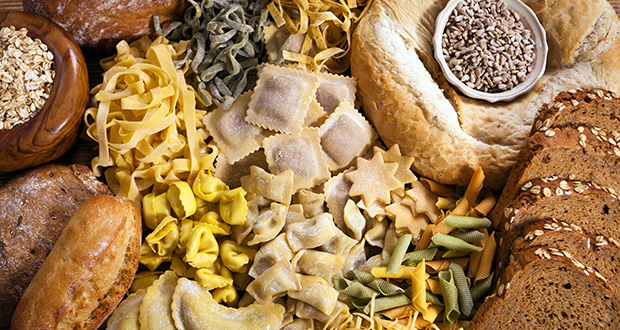The five commandments for healthy carbohydrates

Carbohydrates often get a bad rap, especially with the increasing prevalence of low and no-carb diets. Many people shy away from foods like bread, pasta and potatoes due to the misconception that it will lead to excess weight gain.
However, restricting carbohydrates in a bid to slim down can leave our bodies feeling lethargic and fatigued. If you’re feeling conflicted between pro-carb and anti-carb, I’m here to tell you that not all carbohydrates are created equal, and they aren’t all “bad” – with some more nutritious than others.
The carbohydrate portion of our diet should include plenty of wholegrain and low glycemic index foods as these provide long-lasting energy to fuel our bodies and brains, as well as a range of micronutrients to keep us healthy. Carbohydrates, alongside protein and fat, make up the three vital macronutrients required for our bodies to stay alive and function optimally. That’s why a diet low in nutritious wholegrain carbohydrates can often leave us feeling slow and sluggish.
To help break through some of the misinformation about carbohydrates, I’ve compiled five recommendations for incorporating healthy carbs into your diet to support energy levels, increase brain power and lift your mood.
However, if you regularly feel fatigued and suspect your carbohydrate intake may be too low, speak to your healthcare professional about taking an energy-boosting supplement that may improve cellular energy production. Look for natural supplements that contain nicotinamide adenine dinucleotide (NAD) – often referred to as the molecule of youth – and is responsible for turning nutrients into energy.
5 commandments for healthy carbohydrates:
- Low carb does not equal low body weight. There is a common misconception that cutting back on carbs will result in weight loss, but this is not necessarily the case. When people embark on a low carb diet, dropping a few kilos is more likely to be caused by reducing overall calorie consumption and staying away from highly processed foods, rather than the absence of carbs. Many health professionals do not support low carb diets, as they tend to be high in saturated fat, low in fibre, and lacking in essential vitamins. They can also be difficult to maintain, which can lead to more weight gain in the long run. If you regularly lack energy and suspect it could be due to a low-carb diet, you may benefit from an energy-boosting supplement to assist in converting food sources into energy.
- Know your serving size. When it comes to healthy eating, there’s no one-size-fits-all solution. The Australian Dietary Guidelines recommend tailoring the number of core food groups servings based on age and gender. For example, men and women aged between 19-50 should aim for six servings of grains each day, whereas this is reduced to four serves for women ages 51-70.[1] The guidelines recommend eating mostly wholegrain carbohydrates, and one serving could be one slice of bread (go for grainy varieties) or ½ cup cooked brown rice. While this is a helpful rule of thumb, individuals may need to adjust portions based on their nutritional requirements. However, be sure to consult a healthcare professional before making major dietary changes.
- Keep it natural. There is an oversupply of packaged and processed foods on the market these days, which are usually made with refined carbohydrates and added sugar. Simplify your diet by eating food in its most natural state possible to ensure you are fueling your body with vitamins and minerals. When grocery shopping, look for the word ‘wholegrain’ on the packet, as this means the grain itself is intact, minimally processed, and retains key vitamins and minerals. Replace processed carbs like white bread and white rice with natural wholegrain versions like wholegrain bread and brown rice to leave you feeling fuller for longer and boost your nutrient intake.
- Low GI, not low carb. The glycemic index (GI) is a scale that measures how quickly blood sugar levels spike after eating certain foods. For example, high GI foods will produce a surge of blood glucose in the body, whereas low GI foods are digested slowly for long-lasting energy. A diet of high GI foods like white bread and cornflakes tend to cause dips and spikes in energy, and some have little nutritional value. Incorporate more low GI carbohydrates into your diet including sweet potatoes, most fruit, grainy bread, oats and legumes such as beans and lentils. If you often reach for sugary snacks as an energy pick-me-up, consider incorporating low GI foods into your diet and perhaps a daily energy supplement could help.
- Look for the grain. You may think you’re incorporating enough healthy grains in your diet, but most Australians eat less than half of the recommended quantity of wholegrains every day.[2] Products advertised as ‘healthy’ can still be highly processed and lacking in nutrients, such as white bread that may contain brown colouring to appear more natural. Instead, look for textured grains that have little chunks and lumps of goodness to ensure you’re getting real wholegrains. And don’t forget to look on the packet for the word ‘wholegrain’.
Teri Lichtenstein is an Accredited Practising Dietitian and Consulting Dietitian at Entity Health nutraceuticals. She is a current board member of Nutrition Australia and has been on committees for organisations such as Dietitians Association of Australia, Sports Dietitians Australia and Health Star Rating.
[1] Australian Dietary Guidelines, https://www.nutritionaustralia.org/national/resource/australian-dietary-guidelines-recommended-daily-intakes
[2] Health Queensland Government, 2018 https://www.health.qld.gov.au/news-events/news/why-you-should-eat-wholegrains-wholemeal-cereal-serves
Email: [email protected]





